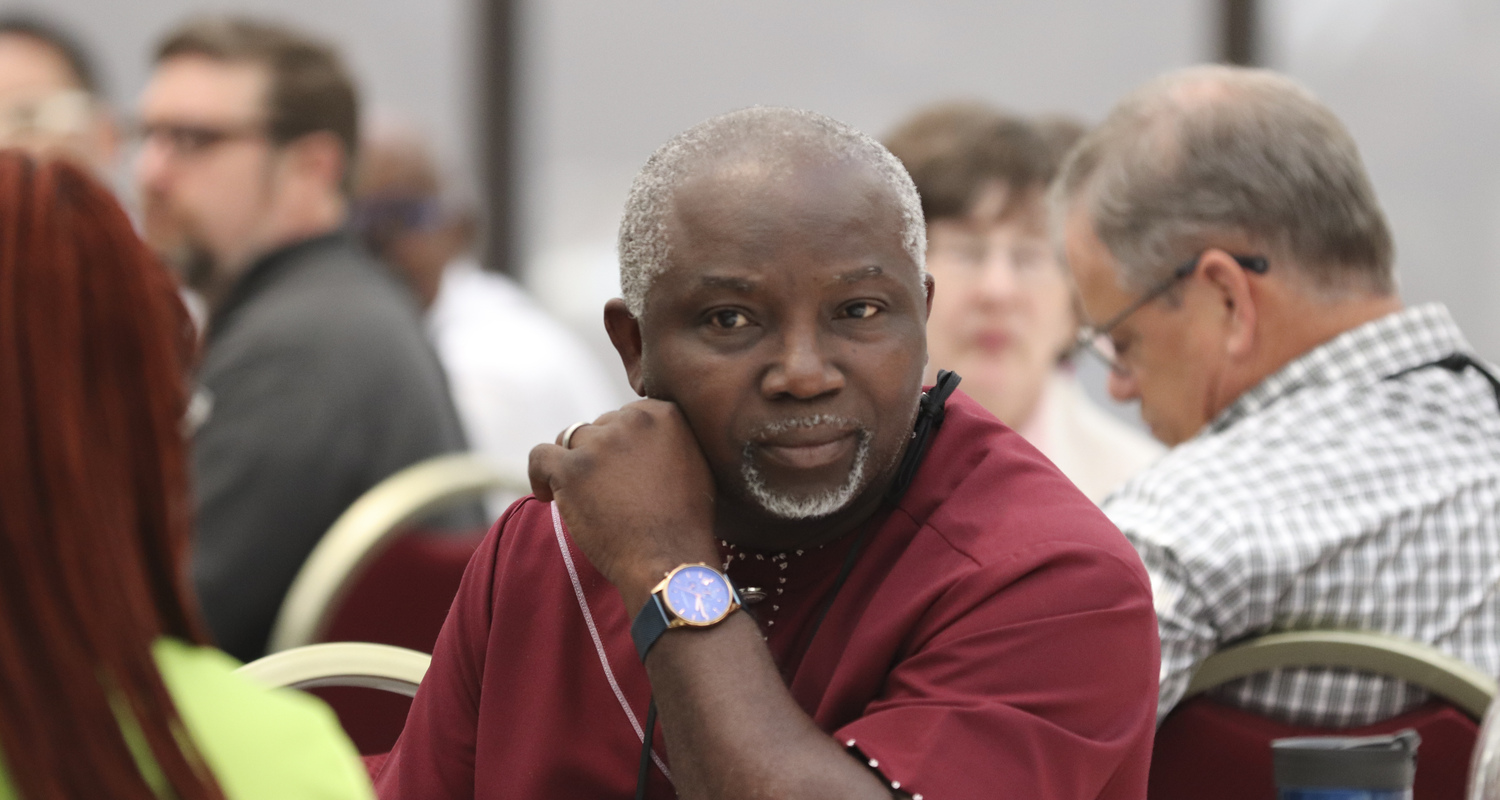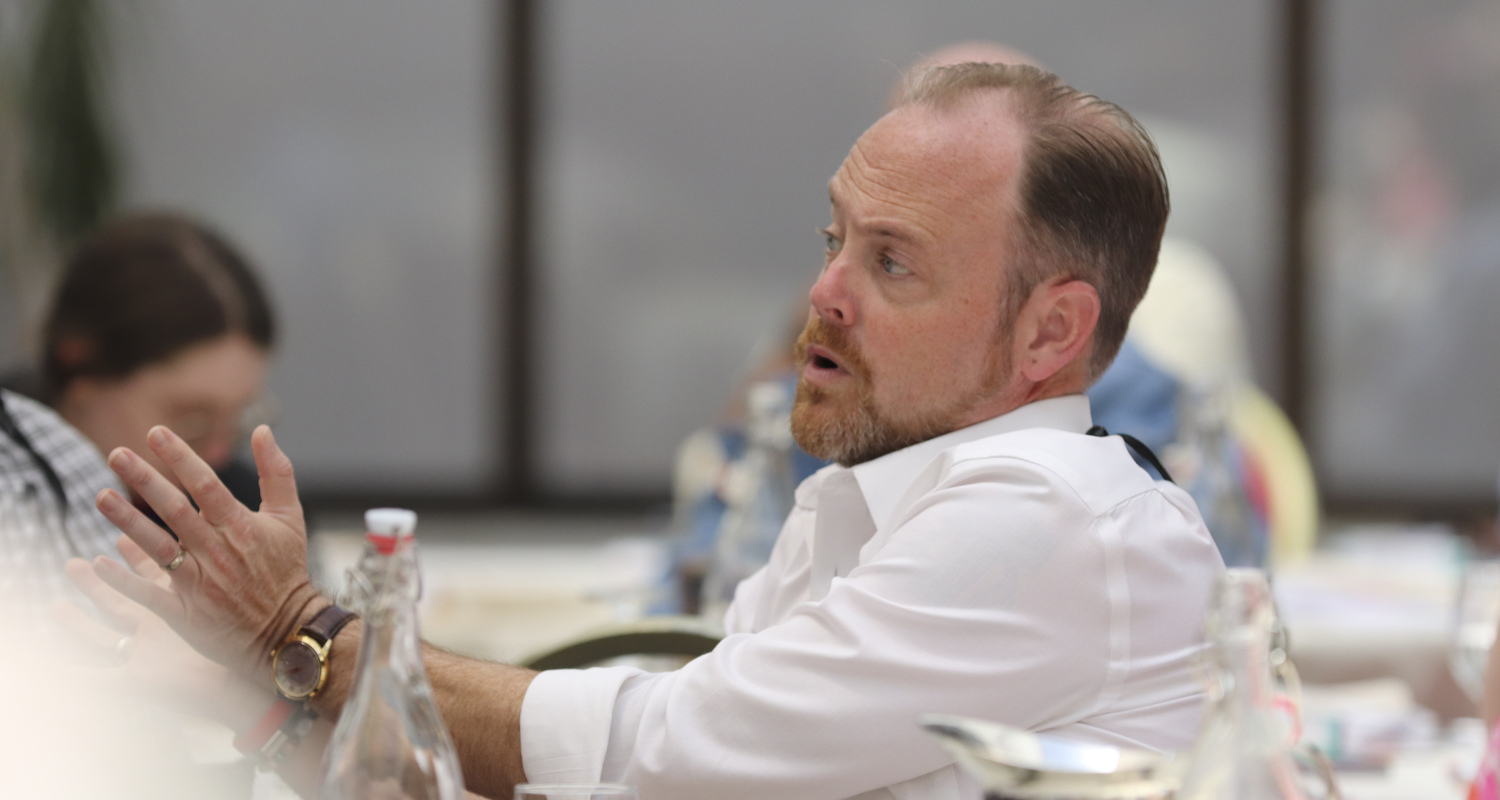.jpg)
The Rev. Gad Mpoyo tells General Assembly participants about the resources available to support immigrant communities. Photo by Kristen Gaydos.
Fifty people attended the 1001 New Worshiping Communities (1001 NWC) lunch at the Marriott’s Skylight Ballroom on Tuesday afternoon to gather and encourage church and mid council leaders to support new worshiping communities and their partnerships with existing churches and mid councils.
The Rev. Nikki Collins, coordinator of 1001 NWC, welcomed the group and introduced her colleagues at the Presbyterian Mission Agency, who are fostering and resourcing ministries that are innovating and growing. Collins gave shoutouts to the work of the Center for Innovation and the 2024 Evangelism Conference, which will be held Oct. 3–5 in Louisville, as well as to those present from 1001 NWC: the Revs. Gad Mpoyo, Jeya So and Shawn Kang (who was present virtually).
“I am so proud of the impact that this movement is having for our church,” said Collins, who highlighted some facts about participants in new worshiping communities:
- 600 of the 800 new worshiping communities that have launched in the past eight years are still worshiping — a 75% success rate.
- 75% are under the age of 55.
- 40% were not previously part of a Christian church.
“New worshiping communities conduct more adult baptisms on average than our existing PC(USA) congregations,” said Collins, who also noted that due to their younger demographic, infant and child baptisms are high in these communities, too.

The Rev. Martin Osae, a new worshiping community leader, is a ruling elder commissioner with Grace Presbytery. Photo by Kristen Gaydos.
“We are doing evangelism as Presbyterians and people are coming to know and trust Jesus through this,” Collins said before introducing a video on a new program for mid councils and leaders called “Pathways to Flourishing.” The program draws on eight years’ worth of wisdom, resources and process and brings them together to help leaders involved on the local and mid council levels bring about new worshiping communities and partnerships between them and existing congregations. To learn more about the “Pathways to Flourishing” program, Collins encouraged people to reach out to their 1001 NWC regional associate.
“For new worshiping community leaders, we provide in-depth assessments and coaches from diverse contexts and cultures,” said Kang, associate for the Central and Western Regions. Kang highlighted offerings like apprenticeships and training events on leadership development, outreach, financial sustainability and spiritual care. Kang also introduced various grants to begin, grow and sustain new ministries, as well as support their leaders through health care and sabbath grants.
“For presbytery staff and committees, we have specific coaching and training geared towards supporting and resourcing staff, committees and missions that oversee the 1001 new worshiping communities,” said Kang.
Mpoyo presented the ways he is working with immigrant communities and their church and presbytery partners through the Accents! resource and Inspire! conferences hosted by presbyteries in the Southeast, West Coast, Midwest and Northeast parts of the country. Inspire! events will be held near Cincinnati and in New York City later this fall.

The Rev. David Watson, a teaching elder commissioner with the Presbytery of South Louisiana, says he cares about partnerships between new worshiping communities and churches in transition. Photo by Kristen Gaydos.
After the presentations of 1001 NWC staff, Collins invited the group to express what was on their minds.
The Rev. David Watson, a teaching elder commissioner with the Presbytery of South Louisiana, asked a question about how to help traditional churches in transition points who have resources like buildings and how they may discern ways to share or transfer those resources to growing new worshiping communities. This question was met with discussion of the experiences of others in the room, including the Rev. Mark Elsdon, author of “Gone for Good? Negotiating the Coming Wave of Church Property Transition” and Dr. Corey Schlosser-Hall, deputy executive director for Vision and Innovation at the Presbyterian Mission Agency, who will be hosting an event called “Property with Purpose: Nourishing Faith, Innovation and Repair” on Wednesday morning.
Martin Osae, a ruling elder commissioner from Grace Presbytery and leader of a new worshiping community, spoke to the impact of the partnership between his Ghananian fellowship and Woodhaven Presbyterian Church in Irvine, Texas. Through the partnership with Woodhaven and Grace Presbytery, Osae has organized a group to make property improvements to Woodhaven and formed a men’s fellowship between members of both churches. Osae has also offered his time and perspective to serve on committees of the presbytery, helping to shape how the presbytery understands and responds to new worshiping communities and immigrant churches. “I often say if you are not around the table, you are on the table,” said Osae. “I like to be involved.”
Before closing in prayer to enable commissioners to get to the next plenary, Collins highlighted ways that 1001 NWC is training new leaders in learning Presbyterian polity and working with mid councils within the language of the Book of Order to “be as expansive as you want to be when it comes to chartering congregations and getting people to the table.”
